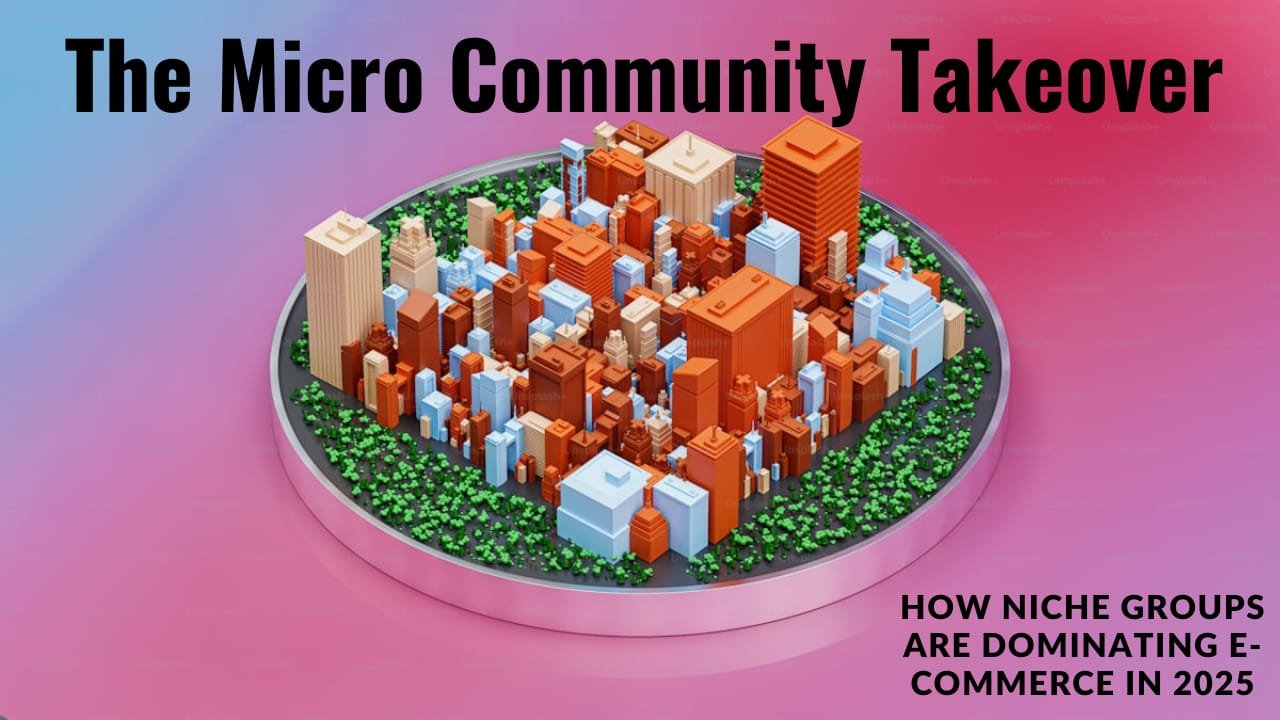Transforming Niche into Empire: How Micro-Communities are Shaping the Future of E-Commerce in 2025

The emerging e-commerce system is undergoing a significant shift. Until now, it has relied on broad targeting and mass-market promotion strategies. However, this approach is now being replaced by micro-community driven commerce. This new strategy focuses on targeting smaller, loyal, and highly engaged groups, and is expected to become one of the most effective methods for building successful online businesses.
In this article, we will explore how micro-communities are set to play a crucial role in the future growth of e-commerce, what will be the Future of E-commerce in 2025 and what this means for businesses today.
Understanding E-Commerce through Micro-Communities
Micro-communities refer to close-knit groups of individuals who share specific interests, values, or lifestyles. Unlike broader audiences, these communities have a higher level of intimacy, authority, and trust.
In 2025, brands will collaborate with these micro-communities to:
- Create tailored products that resonate with their target audience
- Establish genuine connections and build goodwill within the community
- Provide additional value and benefits that are relevant to their niche
This shift towards micro-community partnerships presents new opportunities for advertisers as well. Platforms like Discord, Reddit, as well as private Facebook and WhatsApp groups offer companies innovative ways to engage with their customers.
With access to better analytics and tools, it’s now possible to scale E-commerce operations without loosing authenticity, even in micro-niche segments.
The rise of micro and nano-influencers has also contributed to this change in influencer marketing dynamics. It is no longer necessary to have a large following in order to achieve high engagement rates and establish a strong connection with one’s audience.

Why Micro-Communities are Effective
Traditional advertising methods often come across as intrusive and impersonal. In contrast, when engagement occurs through micro-communities, consumers perceive it as genuine and trustworthy.
It is more likely for someone to make a purchase based on a recommendation from a trusted community member rather than from a random advertisement. This emotional connection fosters brand loyalty over time.
Additionally, micro-communities serve as valuable sources of customer feedback and user-generated content. Companies can leverage these insights to enhance their products, refine marketing strategies, and improve customer service models.
As a result, an effective feedback loop is established where customers feel heard and appreciated, further strengthening their loyalty towards the brand.

Building a Brand Within Micro-Communities
To build a brand within micro-communities, start by selecting a community that aligns with the brand values and product offerings. For instance, a business selling eco-friendly pet supplies can target communities focused on sustainable living or ethical pet care.
Once you’ve identified the right micro-community, focus on making a meaningful impact. This could involve sharing educational content, engaging in discussions, providing exclusive products or discounts, or even collaborating with community members to create new products. The goal is not just to sell but to become an integral part of the community.
Another effective strategy is to cultivate brand ambassadors within these micro-communities. These individuals are not traditional influencers but regular community members who genuinely love the brand and naturally promote it. Their endorsements carry more weight due to the trust already present within the community.

SEO and Content Strategies for Micro-Audience Commerce
Tailor your SEO strategy to match the language and search habits of the specific community you are targeting. Use long-tail keywords, address common questions, and create content that addresses niche topics relevant to the community.
Instead of generic content, delve into community-specific subjects. For example, rather than writing a generic post about pet care tips, focus on topics like eco-friendly grooming routines for rescue dogs. This tailored approach helps differentiate your brand within the niche market.
Storytelling is a powerful tool. Share community stories, customer experiences, and testimonials to humanize your brand and establish emotional connections with potential customers. By 2025, these emotional connections will play a crucial role in driving conversions.
To reach your ideal audience, you must optimize your product listings for niche platforms that cater specifically to micro-communities.
Hyper-Personalized Shopping Experiences
In the near future, personalization will be an expected norm rather than a trend. For brands targeting micro-communities, this means offering customized product recommendations, dynamic landing pages, and group-specific offers based on preferences and behaviors.
Utilize AI and machine learning tools to analyze community interactions and provide valuable insights for tailored actions. Personalized shopping experiences, such as customizing shopping pages for specific groups or creating targeted email content for niche audiences, enhance engagement and drive conversions.

The Rise of Peer-to-Peer Influence in Micro Communities
Trust has no longer been cultivated through glamorous ads in 2025; rather, it has been earned through real conversations in micro-communities. Peer-to-peer influence is emerging as a very powerful force in consumer behavior. Shoppers would generally feel more likely to purchase an item that a peer community member recommended instead of a celebrity or influencer. Such “everyday experts” – a skincare enthusiast in a Reddit thread or a gamer in a Discord group – genuinely drive conversions and engagement.
Rather than simply pushing promotions, brands accessing these communities enable relevant conversations, reviews, and co-creation. WhatsApp groups, niche Facebook communities, and Telegram channels are the next generation of organic brand advocating hotbeds. The micro-influencers, operating within those domains, enjoy a much closer relationship with their audience, hence lending more trust and loyalty. E-commerce is getting authentic growth more than ever before from brands taking their front line with these individuals and prioritizing audience feedback loops.
One of the keys to capturing a community’s attention is to craft standout product images and titles that convert, especially on saturated marketplaces.

Decentralized Platforms Are What Makes It All Interesting for Internet Use
Indeed, the stronghold of traditional platforms such as the Amazon and eBay now quietly has decentralized marketplaces gradually gaining ground on micro-commerce. Such are those powered by Web3 and blockchain technologies with which sellers and buyers transact directly without much interference or gatekeeping, thus achieving higher transparency and security of ownership.
Moreover, decentralization slashes down platform fees along with faster payments and offers greater control over user data-an interesting coating for both small merchants and privacy-minded consumers. Communities are building their own tokenized ecosystems where users are rewarded for some contributions, curations, or promotions of products.
OpenBazaar and Origin Protocol, for instance, are going far into what e-commerce would become. In fact, they make space for ultra-customized, community-first shopping experiences. With this, the future E-commerce in 2025 niche driven empires will probably find their homes, perhaps in decentralized platforms, as many users have shown concern about wanting control and ethical consumption.
You can use smart automation to personalize customer journeys at scale, without making them feel generic or salesy.

Conclusion: A Connection-Built Future of E-commerce in 2025
The future of e-commerce in 2025 lies in building meaningful connections rather than pursuing sheer size. Micro-communities offer a path to sustainable growth through trust, authenticity, and genuine engagement. Brands that recognize the value of these communities and invest in fostering real relationships are poised not only to survive but thrive in the evolving landscape of online commerce.
As we approach 2025, remember that success in e-commerce is not about casting a wide net but about cultivating loyalty within smaller yet dedicated communities.
To learn about more you can go through the Website of blogingco where you can know more details of the Future of E-commerce in 2025

Reference links for the above blog and topics related to this
- https://www.shopify.com/blog/niche-market
- https://www.statista.com/topics/871/online-shopping/
- https://blog.hubspot.com/marketing/hyper-personalization
- https://www.forbes.com/sites/forbesagencycouncil/2023/02/08/the-rise-of-micro-influencers/
- https://www.thinkwithgoogle.com/intl/en-apac/consumer-insights/consumer-trends/local-content-marketing/
- https://hbr.org/2021/09/community-is-the-new-brand
- https://blog.gwi.com/marketing/online-communities/
